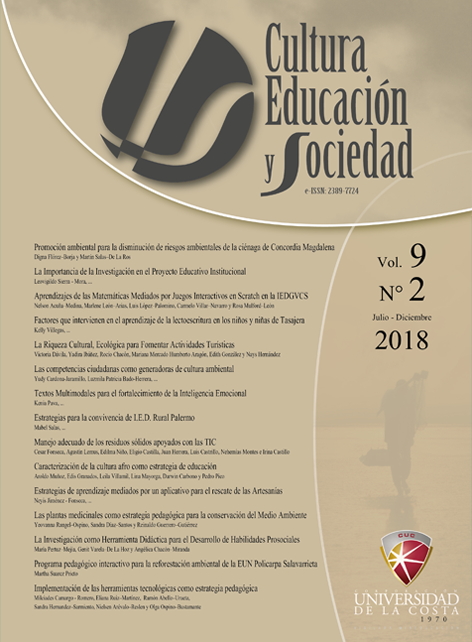The cultural richness, ecological to promote tourist activities
DOI:
https://doi.org/10.17981/cultedusoc.9.2.2018.05Keywords:
Ecotourism; rural community tourism; tradition; heritage; culture; learningAbstract
The purpose of the research is to determine the degree of knowledge they have about their environment, the places that allow us to reveal their history, the ones that allow us to recreate ourselves, etc. With this information, the researchers begin a bibliographic search to delve into the topic of Ecotourism, as well as recreational and recreational activities that may be attractive to visitors. The investigation is qualitative, descriptive. The collection technique was the interview and the observation. The participants in the application were 5 teachers and 20 students from the 10th and 11th grades, from the Educational Institution Roque de los Ríos Valle. As conclusions, it can be inferred that it is the teachers who should inquire about all the sites of interest that the municipality has, appropriate this information and share it with the students to motivate them to expand their horizon, setting personal and community development goals.
Downloads
References
Arévalo, J. M. (2004). La tradición, el patrimonio y la identidad. España. Obtenido de http://sgpwe.izt.uam.mx/files/users/uami/mcheca/GEOPATRIMONIO/LECTURA2E.pdf
Avendaño ,I;Cortés O , Guerrero Hilda( 2015) Competencias sociales y tecnologías de la información y la comunicación como factores asociados al desempeño en estudiantes de básica primaria con experiencia de desplazamiento forzado Diversitas: Perspectivas en Psicología, vol. 11, núm. 1, 2015, pp. 13-36 Universidad Santo Tomás Bogotá, Colombia.http://www.scielo.org.co/pdf/dpp/v11n1/v11n1a02.pdf.
Burbano, A. (19 de febrero de 2011). Comunidad Hostertur. Obtenido de http://comunidad.hosteltur.com/post/2011-02-09-turismo-comunitario-en-colombia-el-caso-de-la-ruta-del-sur.html
Burgos, R. (2016). El turismo comunitario como iniciativa de desarrollo local. Caso localidades de Ciudad Bolívar y Usme zona rural de Bogotá. Hallazgos, 13(26). Obtenido de http://revistas.usta.edu.co/index.php/hallazgos/article/view/3162
Campodónico, R., & Chalar, L. (Julio de 2010). TURISMO: UNA CIENCIA EN CONSTRUCCION. Universidad de Caxias do Sul, 1-15. Obtenido de https://www.ucs.br/ucs/eventos/seminarios_semintur/semin_tur_6/arquivos/09/Turismo%20una%20ciencia%20em%20construccion.pdf
Capanegra, C. (2008). TURISMO Y DESARROLLO: crecimiento y pobreza. (S. M. Arnaiz Burne, & A. C. Dachary, Edits.) Buenos Aires, Mar del Plata, Argentina. Obtenido de http://www.cuc.udg.mx/sites/default/files/publicaciones/2008%20-%20Turismo%20y%20Desarrollo.%20Crecimiento%20y%20Pobreza%20-%20interiores.pdf
Esmoris, M. (2001). El patrimonio y las tradiciones culturales. España. Obtenido de http://www.montevideo.gub.uy/sites/default/files/patrimonio.pdf
Guzmán, M. C. (2017). Marco teórico para la construcción de una propuesta de turismo rural comunitario. (U. N. Distancia, Ed.) Revista de investigación agraria y ambiental, 8(1). Obtenido de http://hemeroteca.unad.edu.co/index.php/riaa/article/view/1841/2060.
Guerrero. H, Cepeda,M.(2016)El impacto del líder comunitario en el siglo XXI. EDITORIAL UNIVERSITARIA DE LA COSTA. Barranquilla-Colombia .
Jiménez, I. V. (Mayo de 2012). LA ENTREVISTA EN LA INVESTIGACIÓN CUALITATIVA: NUEVAS TENDENCIAS Y RETOS. Revista Calidad en la Educación Superior, 119-139. Obtenido de http://biblioteca.icap.ac.cr/BLIVI/COLECCION_UNPAN/BOL_DICIEMBRE_2013_69/UNED/2012/investigacion_cualitativa.pdf
Reyes, G., Marín, F., Gutiérrez, C. Satisfacción del cliente de las posadas turísticas en la Península de Paraguaná, estado Falcón, Venezuela. Multiciencias, vol. 6, núm. 3, 2006, pp. 271-277 Universidad del Zulia. Punto Fijo, Venezuela
Marulanda, D. (2012). Ecoturismo en Colombia. (D. M. López, Editor) Obtenido de blogspot: http://gestionandari.blogspot.com.co/2012/
Murillo, J., & Martínez-Garrido, C. (2010). Investigación Etnográfica. (U. A. Madrid, Ed.) Madrid, España. Obtenido de https://www.uam.es/personal_pdi/stmaria/jmurillo/InvestigacionEE/Presentaciones/Curso_10/I_Etnografica_Trabajo.pdf
Natura, F. (09 de Febreo de 2011). Turismo Comunitario en Colombia, el caso de La Ruta del Sur. Obtenido de http://www.forumnatura.org/2011/02/09/turismo-comunitario-en-colombia-el-caso-de-la-ruta-del-sur/
Vanegas, G. M. (2006). Ecoturismo, instrumento de desarrollo sostenible. Medellín, Colombia. Obtenido de http://bibliotecadigital.udea.edu.co/bitstream/10495/149/1/EcoturismoInstrumentoDesarrolloSostenible.pdf
Downloads
Published
How to Cite
Issue
Section
License
Copyright (c) 2018 CULTURA EDUCACIÓN Y SOCIEDAD

This work is licensed under a Creative Commons Attribution-NonCommercial-NoDerivatives 4.0 International License.
![]()
Creative Commons 2020 CULTURA EDUCACIÓN Y SOCIEDAD
This article is under international license Creative Commons Reconocimiento-NoComercial-SinObrasDerivadas 4.0.
The published articles are the sole responsibility of their authors and do not necessarily reflect the opinions of the editorial committee.
CULTURA EDUCACIÓN Y SOCIEDAD respects the moral rights of its authors, who assign to the editorial committee the patrimonial rights of the published material. In turn, the authors inform that this work is unpublished and has not been previously published.
All articles are under a:
Licencia Creative Commons Atribución-NoComercial-SinDerivadas 4.0 Internacional.
![]()


 English
English
 Español (España)
Español (España)




_12.53_.27_p_. m_._3.png)





_12.57_.35_p_. m_._3.png)
_12.50_.37_p_. m_._3.png)



